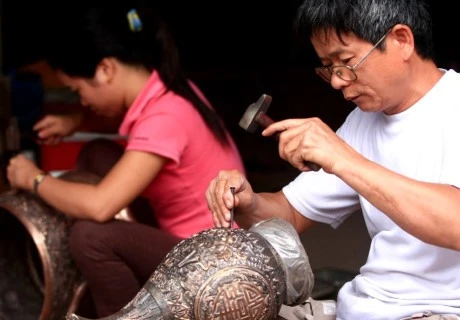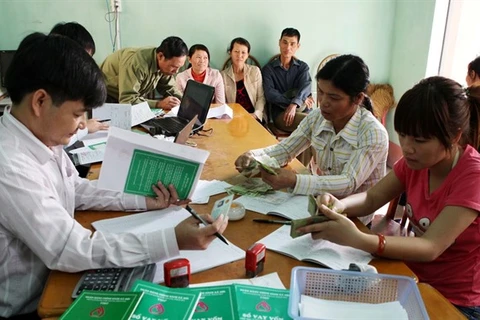Hanoi (VNS/VNA) - More efforts should be made to boost administrative reform in the banking system to further facilitate access to credit for micro, small and medium enterprises.
This was the consensus at the conference titled “Reforming administrative procedures – improving credit access” held on April 20 by the State Bank of Vietnam and the Chamber of Commerce and Industry (VCCI).
According to VCCI data, 97 percent of the 500,000 enterprises operating in Vietnam are small and medium sized (SMEs). Of these, 85-90 percent is micro and small companies.
Bank capital has contributed significantly to the development of the private economic sector, especially the SMEs. This was demonstrated in the rapid improvements of both the overall business environment and the credit ranking of the country.
Vietnam’s business climate ranked 68th out of 190 economies surveyed in the World Bank’s Doing Business Report 2018, a jump of 14 ranks against the previous year – a record improvement. Its Getting Credit Index was among the top 30 economies, with the 29th position.
VCCI Chairman Vu Tien Loc said that the banking sector’s contributions to the economy are more than the numbers, particularly given that about 55 percent of medium- and long-term capital is being provided by bank credit.
At present, about 80 percent of credit is channeled into the production sector while the capital supply for the Building-Operate-Transfer (BOT) tends to decline, Loc said. However, he pointed out that a number of enterprises have still found it difficult to access bank credit.
“Some businesses told me that they have thousands of hectares of farmland for production, but bank regulations require the mortgage of workshops to get loans. This is not to the advantage of agricultural enterprises,” Loc said.
In fact, this type of businesses is often small-scale, lacks collateral assets and management experiences and is vulnerable to market changes, all of which make it difficult for them to gain credit from banks.
“We need to change the method of giving credit so that farmers can use their own land as the mortgage to get capital to grow their businesses. This is not the responsibility of the banking industry, but the Government,” Loc said.
Micro, small and medium enterprises, as well as women-owned businesses, are defined as the engines of growth and innovation in the APEC region, alongside agriculture and innovative startups, in which additional investment is urged.
One of the critical issues for their development is financing, and the Government should improve credit access for these targeted enterprises, especially reforming lending procedures for agricultural and startup businesses, Lộc said.
Dao Minh Tu, Deputy Governor of the State Bank of Vietnam (SBV), said Vietnam has created a legal framework to build a truly equal credit relationship between banks and businesses. Banks have cut back a wide range of cumbersome procedures, as well as provided diversified products.
At present, SBV has built a big database on credit information, which helps assess the performance of enterprises, their creditworthiness and financial capability. Businesses also know the banks’ information.-VNA
This was the consensus at the conference titled “Reforming administrative procedures – improving credit access” held on April 20 by the State Bank of Vietnam and the Chamber of Commerce and Industry (VCCI).
According to VCCI data, 97 percent of the 500,000 enterprises operating in Vietnam are small and medium sized (SMEs). Of these, 85-90 percent is micro and small companies.
Bank capital has contributed significantly to the development of the private economic sector, especially the SMEs. This was demonstrated in the rapid improvements of both the overall business environment and the credit ranking of the country.
Vietnam’s business climate ranked 68th out of 190 economies surveyed in the World Bank’s Doing Business Report 2018, a jump of 14 ranks against the previous year – a record improvement. Its Getting Credit Index was among the top 30 economies, with the 29th position.
VCCI Chairman Vu Tien Loc said that the banking sector’s contributions to the economy are more than the numbers, particularly given that about 55 percent of medium- and long-term capital is being provided by bank credit.
At present, about 80 percent of credit is channeled into the production sector while the capital supply for the Building-Operate-Transfer (BOT) tends to decline, Loc said. However, he pointed out that a number of enterprises have still found it difficult to access bank credit.
“Some businesses told me that they have thousands of hectares of farmland for production, but bank regulations require the mortgage of workshops to get loans. This is not to the advantage of agricultural enterprises,” Loc said.
In fact, this type of businesses is often small-scale, lacks collateral assets and management experiences and is vulnerable to market changes, all of which make it difficult for them to gain credit from banks.
“We need to change the method of giving credit so that farmers can use their own land as the mortgage to get capital to grow their businesses. This is not the responsibility of the banking industry, but the Government,” Loc said.
Micro, small and medium enterprises, as well as women-owned businesses, are defined as the engines of growth and innovation in the APEC region, alongside agriculture and innovative startups, in which additional investment is urged.
One of the critical issues for their development is financing, and the Government should improve credit access for these targeted enterprises, especially reforming lending procedures for agricultural and startup businesses, Lộc said.
Dao Minh Tu, Deputy Governor of the State Bank of Vietnam (SBV), said Vietnam has created a legal framework to build a truly equal credit relationship between banks and businesses. Banks have cut back a wide range of cumbersome procedures, as well as provided diversified products.
At present, SBV has built a big database on credit information, which helps assess the performance of enterprises, their creditworthiness and financial capability. Businesses also know the banks’ information.-VNA
VNA
























